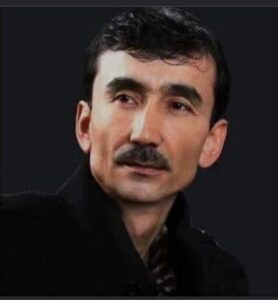
Eset Abdureshit, writer, journalist, former editor in chief in Ili River. He got arrested in January 2020, sentenced 6 years. His books got rid of the book’s stores and libraries, essays got banned, his readers also got targeted in Ghulja. His works were selected into Uyghur textbook. The reason of his arrestment is unknown.
Eset Abdureshit was born on November 22, 1967, his high educated family were living in the town of Tokuztara. After completing his studies at the Faculty of Languages and Literature in Xinjiang University in 1988, he embarked on a career as a reporter-editor at the Toqquztara County Radio and Television Bureau. His contributions to the field became more prominent when he joined the “Ili Evening Daily” in 1992, where his literary works and short stories received widespread attention and acclaim.
Recognizing his literary and editorial expertise, the Union of Literary Artists of Ili Prefecture appointed Eset Abdureshit as the Uyghur editor of “Ili River” magazine in 1996. Since the 1990s, he has actively engaged in diverse literary genres, including novels, short stories, prose, literary journalism, and scientific articles.
Eset Abdureshit got awarded in 1993, for his report titled “Even A Drop of Tear is Sad Enough”. His article “Dust Landing on the Ruby” achieved second place in the “Caravan Road” award, in the evaluation of artistic works. Additionally, he earned the second place in the 7th national minority media works evaluation. The year 1995, his fiction “Men,” which achived the seventh “Hantengri award” in the evaluation of the best works. Furthermore, his fiction “Adinoshka” received the third “Ili River” prize. In 2015 his short novel “Cloud Gril” and “Ili Road is Winding” got 2015th “Hantengri Literature Award”.
Eset Abdureshit’s novel “White Handkerchief” clinched the esteemed third Tangritagh Literature and Art Award. The novel’s impact resonated further with its translation into Chinese, published in the 2011 issue of “Literature of Nations” magazine. Moreover, his fiction “The Story of the City” found its place in the high school Uyghur textbook, serving as a valuable resource for students. The translation of some of his works into Chinese and Kazakh languages, along with their inclusion in collective collections, affirmed their quality and multidimensional appeal.
The distinctive artistic style and unique characteristics of Eset Abdureshit’s works have cemented his reputation as a highly regarded figure in the Uyghur literary sphere.
His latest novel “Ili Road is Winding“, got him in trouble as his friends said.

